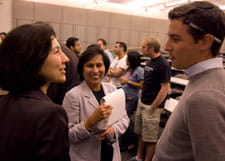New faculty-designed case is academic centerpiece for Biotech & Healthcare contest, which marks its fifth year by attracting scholars from top schools worldwide
12/10/2008 - Business students from around the globe are expected to participate in the Kellogg School’s 2009 Biotech & Healthcare Case Competition, which marks its fifth anniversary in January. Hosted by the Kellogg Center for Biotechnology, the competition is sponsored by Genzyme, a Boston-based biotechnology company that first partnered with the center in 2005.
 |
| Professor Alicia Löffler (left) |
| Photo © Nathan Mandell |
To participate in the competition, teams of 3-5 students must submit an application to the center by Dec. 15. Selected teams will receive a biotechnology-themed case on Jan. 23 and must present their solution to the case on Jan. 31 to a panel of judges, which includes three senior executives from Genzyme. First-place winners receive $5,000 and a trip to Genzyme headquarters, while second-place winners receive $1,500 and third-place winners receive $500. This is the first year that the competition is open to students worldwide, and teams from Barcelona, London and China have already expressed interest in participating.
Offering the prize of a trip to Genzyme — a first this year — is one of the main attractions for students entering the competition, says Lynn Harris, the center’s director of marketing and one of the event planners. “In this economic environment, where there aren’t a lot of job opportunities and companies are cutting back on hires, this is a real opportunity,” she says. “Students can do something that will be seen and acknowledged. It will help them stand out from other students. And, they get in front of Genzyme, one of the top companies in the industry.” Several previous winners of the competition have been hired by Genzyme. The biotechnology community is also small, notes Alicia Löffler, professor and director of the Center for Biotechnology, so networking with professionals in the field is crucial to students’ success.
While previous competitions featured cases generated by Harvard University, this year’s case was co-written by Harris and Tim Calkins, clinical professor of marketing at the Kellogg School. The case is based on a real biotechnology issue from 2007. “The impetus was to write a brand-new case that would be relevant to issues facing a company, and would be interesting and challenging to students,” Harris says. “Students won’t be able to go online and find the answers.” Harris and Calkins also deliberately wrote a case that has more than one right answer.
“The power of a case,” says Calkins, who regularly uses case studies in his marketing classes, “is that it really forces students to think not just about theory, but how to apply theories to solve a problem.”
True to the Kellogg School’s emphasis on experiential learning, the competition simulates the feeling of working in the biotechnology field. Not only do students learn how to analyze a case, but they do so under taxing conditions, as biotechnologists do. Löffler explains that biotechnologists have limited resources, work “under the ticking clock of intellectual property” and constantly have to revisit ethical issues, “because the products you develop are usually very controversial.” To be successful in the biotechnology field, students also need to learn how to take an interdisciplinary approach to cases and find solutions that balance the economical, political and ethical issues involved. Calkins hopes that this year’s case will “force students to think through key issues and develop a thoughtful plan of attack.”
As an added benefit, this year’s case aligns well with the Kellogg course
Bio-Medical Marketing, which was created in 2006, five years after the biotechnology major was first introduced at Kellogg. “We want to train the best leaders in the world,” Löffler says. “And to do that, you have to have the opportunity to lead. You have to practice leading.”






